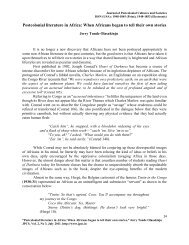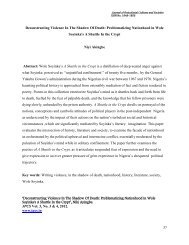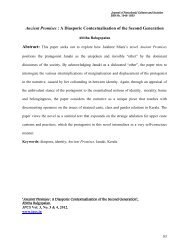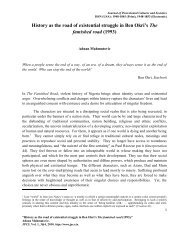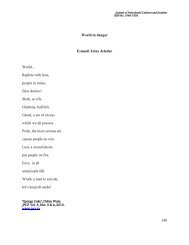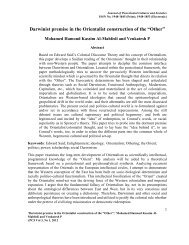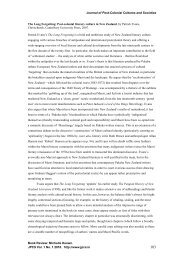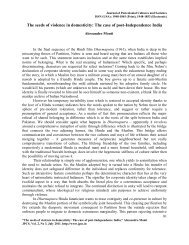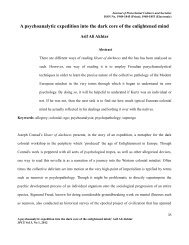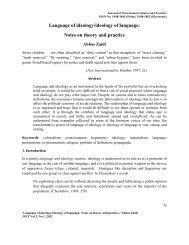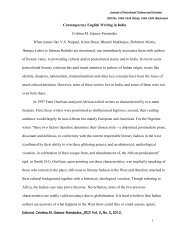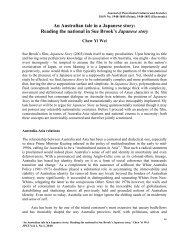'Crossing Thresholds': Radical Notes in Women's Writings ... - JPCS
'Crossing Thresholds': Radical Notes in Women's Writings ... - JPCS
'Crossing Thresholds': Radical Notes in Women's Writings ... - JPCS
Create successful ePaper yourself
Turn your PDF publications into a flip-book with our unique Google optimized e-Paper software.
Journal of Postcolonial Cultures and SocietiesISSN No. 1948-1845 (Pr<strong>in</strong>t); 1948-1853 (Electronic)The texts used <strong>in</strong> the present paper are either English translations from different SouthAsian ‗vernaculars‘ or <strong>in</strong>digenous writ<strong>in</strong>gs <strong>in</strong> English. The reason for not <strong>in</strong>clud<strong>in</strong>g thecosmopolitan young women writers <strong>in</strong> English though far more accessible and visible orthe South Asian diaspora (with their attendant immigrant life and/or sensibilities),<strong>in</strong>stead, opt<strong>in</strong>g for those who write <strong>in</strong> regional languages or ‗vernacular‘ (even thoughtheir works may be accessed through translation) is that the latter‘s writ<strong>in</strong>gs arepreoccupied with cont<strong>in</strong>gent realities and grass root experiences that are often unknownto even to a majority of South Asians.This paper argues for a different academic practice <strong>in</strong> relation to women‘s writ<strong>in</strong>gs andacknowledges their specifically literary and <strong>in</strong>tellectual contributions of activisms. Thewriters selected for the purpose are from India, Pakistan, Bangladesh, and Sri Lanka.Their writ<strong>in</strong>gs go beyond the domestic spheres of 'hearth and home 'and they themselvesfreely and boldly on a variety of themes. Though there may still be cases of theoccasional male envy, these new writers are not hold<strong>in</strong>g back <strong>in</strong> express<strong>in</strong>g the po<strong>in</strong>t ofview from a fem<strong>in</strong><strong>in</strong>e eye without adopt<strong>in</strong>g fem<strong>in</strong>ist postures. Or, as poetess RukmaniBhaya Nair puts it, " Have wrung poems from households tasks/carry<strong>in</strong>g water, child,sorrow... The issues that occupy these writers are no longer fem<strong>in</strong>ist or chauv<strong>in</strong>istic, but,socio- political issues of everyday life.One of the earliest <strong>in</strong>stances of ‗literary radicalism‘ <strong>in</strong> the Indian Subcont<strong>in</strong>ent , to usethe phrase made popular by Priyamvada Gopal <strong>in</strong> her now famous work Literary<strong>Radical</strong>ism <strong>in</strong> India: Gender, Nation and Transition to Independence (2005) goes back tothe turbulent years of India‘s anticolonial struggle .The year was 1931 when Dr RashidJahan a Muslim young ‗lady doctor‘ from a progressive family contributed two of herstories: ‗Dilli ki Sair‘(A Visit to Delhi) and ‗Parde ke Peeche‘(Beh<strong>in</strong>d the Veil) to anUrdu anthology Angare (Live Embers). Angare was edited by Sajjad Zaheer andconta<strong>in</strong>ed radically progressive short stories and plays by Zaheer, Ahmed Ali, RashidJahan and Mahmuduzzafar .These writers were young and charged with the desire tochange the world, and the anthology was an attempt to shock the reader <strong>in</strong>to a new‘Cross<strong>in</strong>g thresholds: <strong>Radical</strong> notes <strong>in</strong> women’s writ<strong>in</strong>gs from contemporary South Asia,’Madhu S<strong>in</strong>gh<strong>JPCS</strong> Vol 2 No 4, December 201183



